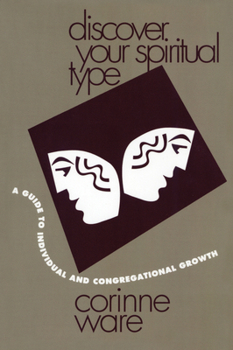Discover Your Spiritual Type
Select Format
Select Condition 
Book Overview
From Urban T. Holmes's spiritual typology and her own experience as a spiritual director and pastoral counselor, Ware provides a framework for people to name and understand their spiritual... This description may be from another edition of this product.
Format:Paperback
Language:English
ISBN:1566991498
ISBN13:9781566991490
Release Date:March 1995
Publisher:Rowman & Littlefield Publishers
Length:156 Pages
Weight:0.55 lbs.
Dimensions:0.3" x 6.0" x 9.0"
Customer Reviews
2 ratings
One Type 1 Spiritualist's review
Published by Thriftbooks.com User , 18 years ago
Corinne Ware is a professor of Ascetical Theology at the Episcopal Seminary of the Southwest (Austin, TX) and former pastoral counselor. Her book, "Discover Your Spiritual Type," is largely based on the work of Urban Holmes and attempts to make Holmes' theoretical work on the relationship between history and spirituality applicable to modern readers. In this, Ware has succeeded magnificently. Her stated goals (1, 117) are to cause the reader to appreciate the unique way in which God has created him as it relates to spirituality and also to create in the reader an appreciation and sense of wholeness for those whose spirituality is different. In this, she has achieve her purposes. "Discover Your Spiritual Type" begins by defining "spirituality" as the way in which a person comprehends and seeks to relate to God, then presents the idea that God has created different people to experience and react to him in different ways-yet these different ways are part of a whole: the Christian Church. Ware then proposes that the reader should seek to strike a balance between integration (identifying with the group as a whole) and individuation (differentiation, being separate from the group); that is to say, be comfortable with who you are and be comfortable letting other people be themselves. Then, Ware presents the core of her book: a diagnostic test of spiritual type and an explanation of what the test results mean. Ware then presents Urban Holmes' historical perspective on spirituality and finally, concludes where she began, reminding the reader to strive for a balance of individuation and integration. The most influential part of the book is its main contribution to the study of spirituality: an analysis of the four spiritual types: Type 1 (God is revealed and I seek to understand him); Type 2 (God is revealed and I seek to emotionally feel him); Type 3 (God is a mystery and I seek to emotionally feel him); and Type 4 (God is a mystery and I seek to understand him). Not only has Ware affirmed my particular spirituality (Type 1), but she has also increased my understanding of and appreciation for my Type 2 friends (Baptists and non-denominationals) and also Type 3s (e.g. Thomas Merton and post-moderns). She has also caused me to think about how I will minister to the various spiritual types in my congregation. The weaknesses of this book are few but include her treatment of Jesus and her presentation of Holmes' historical-spirituality research. While neither of these areas are "bad" (wrong, illogical), they are incomplete and do not advance the purpose of the book. She presents Jesus as the perfect example of one who is both fully integrated and yet fully differentiated, yet her treatment of this thesis is not complete enough to prove her argument. The situation is similar for her treatment of Holmes' research: she tries to condense what appears to be a vast body of work into a few pages, which has resulted in many gaps and a section o
What style of worship best suits you?
Published by Thriftbooks.com User , 22 years ago
I encountered this well-written book in a four week adult study group in my Episcopal church and all the participants found it useful and enlightening. Corinne Ware employs a Meyers-Briggs type of "circle-quadrant" format, but does not tie her designations directly to the standard MB labels, which I believe makes the work more accessible to those who are not already familiar with that system. Ware helps the reader to get a picture of how he or she responds to different worship-styles -- do you feel closer to God while singing rousing church camp songs, or sitting in quiet meditation, or listening to an intellectually challenging sermon, or serving in a soup kitchen for the homeless, or attending a folk-mass, or being surrounded with the resonance of a great pipe organ, or walking a labyrinth, etc. etc. Equally valuable is to identify those "religious experiences" that make you really uncomfortable! The meta message is that ALL worship styles are valid, and while one will work best for you, no one style is inherently superior to others in an absolute way. Ware has the material organized in a fashion that allows for individuals to place themselves in the circle and also for a group to evaluate the worship preference of their church. That discussion can be very valuable in raising the congregation's awareness of why a service is conducted the way it is -- and opens dialogue on whether there are elements of it that they might wish to do differently, other musical styles they might wish to explore, and so on. It was our experience that everyone came away with greater tolerance for others whose preferences differ. The book would also be very useful for a reader seeking to find a personal comfort-zone among the wide array of worship opportunities available.





